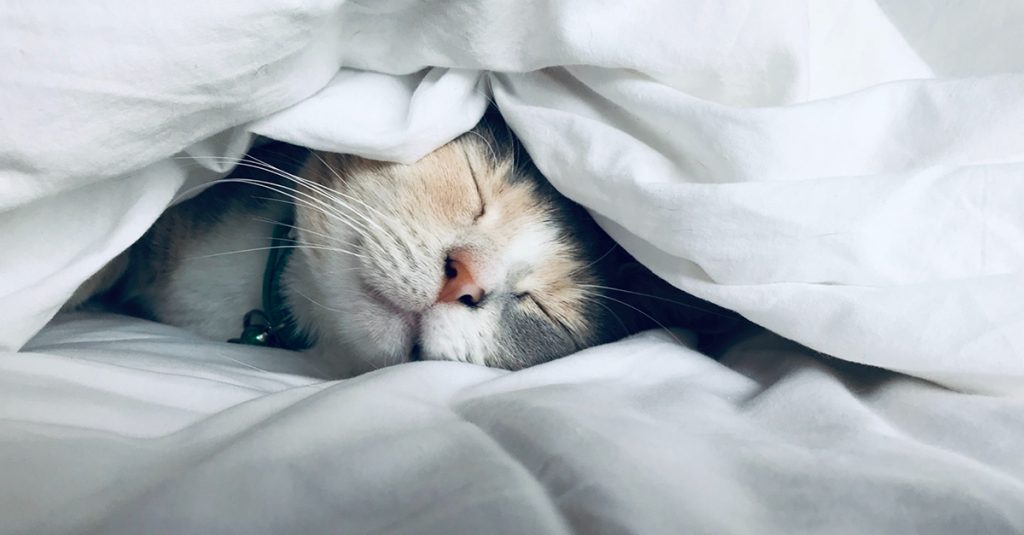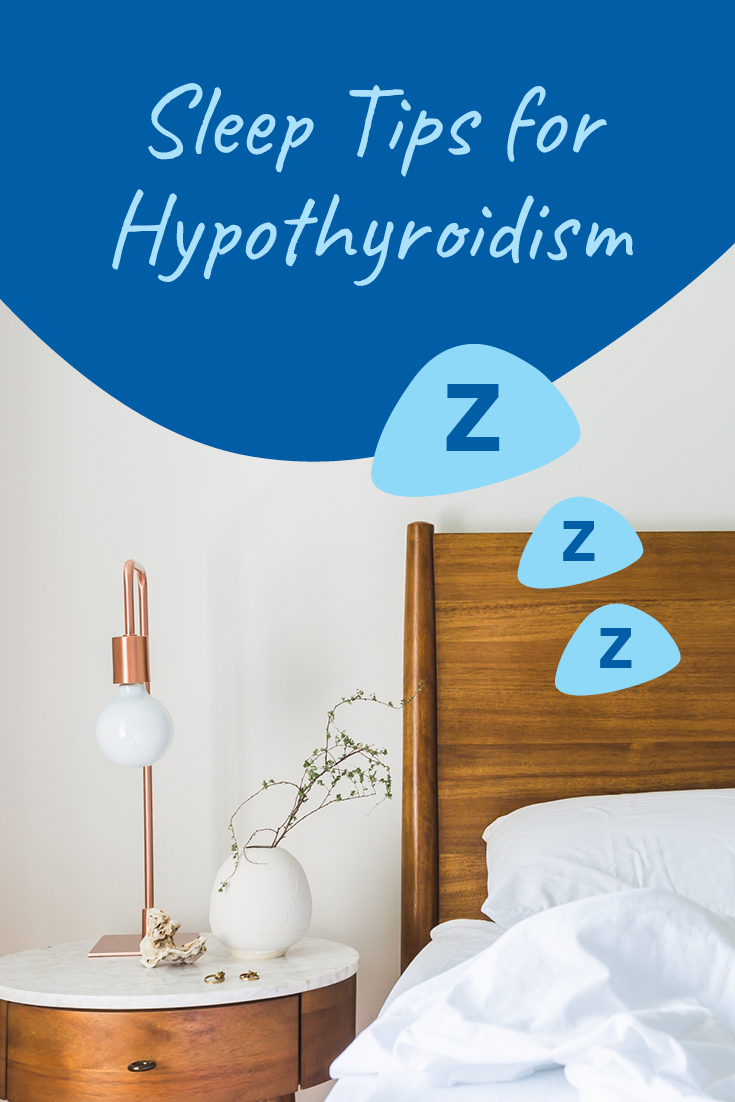Expert Advice

Acella Pharmaceuticals, LLC., is partnering with Heather Procknal, NBC-HWC-CHC, to bring greater awareness to the importance of thyroid care and education. This post was sponsored by Acella Pharmaceuticals and should not be construed as medical advice. Please talk to your doctor about your individual medical situation.
One of the symptoms of hypothyroidism or Hashimoto’s thyroiditis is that “tired-yet-wired” feeling.
If blissful sleep is only a distant memory for you thanks to an underperforming thyroid, then keep reading. There is hope for a great night’s sleep if you first set the stage with some simple pre-sleep strategies.
As you know, your thyroid plays a crucial role in managing your hormones, blood sugar, stress and sleep cycle. If your sleep is compromised and you’re not getting the recommended seven to nine hours of sleep, then it can take a toll on every system in your body.1 To say sleep is important is an understatement.
Restful Sleep Benefits:
Helps regulate hormones including estrogen, progesterone, cortisol, melatonin and adrenalin, which can all impact your ability to lose weight
Gives your digestive system a chance to rest
Recharges your brain for optimal cognitive function
Allows your body to enter a parasympathetic state, which can decrease anxiety and stress
Balances blood sugar levels
Supports immunity
Resets your energy reserves
Tips for Making Restful Sleep Attainable
Now that we’ve stressed how important sleep is, let’s dive into what you can do to make falling asleep and staying asleep more attainable.
Exercise
Make sure you’re prioritizing physical activity in some form every day. Exercise earlier in the day rather than closer to bedtime. Your body temperature varies slightly throughout the day and is ideally 1 to 2 degrees lower in the evening and throughout nighttime. By getting your exercise done earlier, you allow your body to cool down and set the stage for a better night’s sleep. Exercise has also been linked to more restful sleep, making even a little bit of walking beneficial to catching those elusive Zs.
Pro Tip: Aim to have exercise completed at least two hours before bedtime. If you can’t get in a workout, try some gentle stretching.
Balance Your Blood Sugar
If you find yourself waking in the middle of the night, it could be due to low blood sugar. When your body experiences low blood sugar it reacts by raising cortisol levels to trigger the release of glucose. But when this happens, it can jolt you awake before it’s time to get up.
Pro Tip: To avoid this abrupt break in your sleep, try having a protein rich snack with good healthy fats, such as a handful of Brazil nuts or a small banana with peanut butter close to bedtime.
Reduce Blue Light Exposure
Blue light is impactful to your sleep because it directly affects your body's production of the hormone melatonin. One recent Harvard study found a strong correlation between lowered melatonin production and increased blue light exposure.2 This is interesting because melatonin is responsible for making you feel drowsy and exposure to blue light suppresses the production of this important hormone.
The sun is our greatest source of blue light, but LED screens, fluorescent lighting, phones, laptops, tablets and any many other artificial light sources emit blue light. Once the sun goes down, we are no longer triggered to start producing melatonin if we are looking at TV and phone screens late into the evening.
Pro Tip: Set a reminder to put blue light emitting devices away at least one to two hours before bedtime. Or wear blue-light blocking glasses to help reduce the hormone-blocking effects of these light sources.
Create a Cool, Calm, Comfy Cave
How cool is your room?
Experts at sleep.org recommend “… thinking of your bedroom as a cave – it should be quiet, cool, and dark for the best chance at getting enough rest.” They also suggest setting your thermostat to a cooler temperature, ideally between 60 to 67 degrees Fahrenheit.3 You want it to be chilly enough so that you can snuggle under your covers and be warm but not roasting.
When you picture your room, is it free of clutter and distractions?
If not, then clear out things such as work- or school-related items and move them to another room. While you’re at it, clear off your bedside tables and leave only the essentials. This will allow your mind to settle in and focus on sleep rather than feeling compelled to solve that last problem or send one more email.
Are your bed and pillows supportive and cozy?
The Better Sleep Council recommends replacing your mattress every seven to 10 years.4 But this can vary greatly depending on your personal comfort and support needs. It’s also recommended that you replace your pillows every year, as they can lose shape, fill with dust mites and harbor dirt and grim. Ewww!
Is your bedroom very dark when you go to sleep?
Beyond avoiding the use of a phone or computer in bed, what are some other sources of light that might disturb your slumber? Turn your alarm clock face down or cover it so it’s not lighting up the room. If you must use a night light for midnight bathroom breaks, consider using motion sensor night lights so they’re not shining all night long.
Pro Tip: Take a bedroom inventory today and see how it stacks up. Then make a point to create the best “sleep cave” you can, one modification at a time.
BONUS! Sleep-Time Spray
Now that you know how to set yourself up for sleep success, here is an easy DIY Sleepy-Time Spray that you can make to spritz on your bed sheets or pillow before you drift off into a rejuvenating blissful slumber!
What You'll Need:
100 milliliters amber or blue glass spray bottle with atomizer
1 large glass measuring cup with pouring spout
1 small funnel
Ingredients:
20 milliliters unscented witch hazel or vodka (you can use the cheap stuff)
70 milliliters of filtered water or deionized water (don’t use tap water)
15 drops lavender essential oil
<15 drops bergamot essential oil
10 drops frankincense essential oil
Directions:
Measure all ingredients and combine in large glass measuring cup with spout.
Use the small funnel while pouring into the 100 milliliters glass spray bottle.
Return atomizer to glass spray bottle.
Before spraying, give the bottle a few shakes to redistribute the ingredients, otherwise the oils settle on top.
Spritz your pillow a few times and allow a minute for the alcohol (if you used vodka) to evaporate and the essential oil aroma to develop. Breathe deeply and enjoy the calming benefits of this relaxing pillow spray.

Note that DTE products, including NP Thyroid®, have not been reviewed by the FDA for safety or efficacy.
IMPORTANT RISK INFORMATION, INCLUDING BOXED WARNING & INDICATIONS
Important Risk Information
Drugs with thyroid hormone activity, alone or together with other therapeutic agents, have been used for the treatment of obesity. In euthyroid patients, doses within the range of daily hormonal requirements are ineffective for weight reduction. Larger doses may produce serious or even life-threatening manifestations of toxicity, particularly when given in association with sympathomimetic amines such as those used for their anorectic effects.
- NP Thyroid® is contraindicated in patients with uncorrected adrenal insufficiency, untreated thyrotoxicosis, and hypersensitivity to any component of the product.
- In the elderly and in patients with cardiovascular disease, NP Thyroid® should be used with greater caution than younger patients or those without cardiovascular disease.
- Use of NP Thyroid® in patients with diabetes mellitus or adrenal cortical insufficiency may worsen the intensity of their symptoms.
- The therapy of myxedema coma requires simultaneous administration of glucocorticoids.
- Concomitant use of NP Thyroid® with oral anticoagulants alters the sensitivity of oral anticoagulants. Prothrombin time should be closely monitored in thyroid-treated patients on oral anticoagulants.
- In infants, excessive doses of NP Thyroid® may produce craniosynostosis.
- Partial loss of hair may be experienced by children in the first few months of therapy but is usually transient.
- Adverse reactions associated with NP Thyroid® therapy are primarily those of hyperthyroidism due to therapeutic overdosage.
- Many drugs and some laboratory tests may alter the therapeutic response to NP Thyroid ®. In addition, thyroid hormones and thyroid status have varied effects on the pharmacokinetics and actions of other drugs. Administer at least 4 hours before or after drugs that are known to interfere with absorption. Evaluate the need for dose adjustments when regularly administering within one hour of certain foods that may affect absorption.
- NP Thyroid® should not be discontinued during pregnancy, and hypothyroidism diagnosed during pregnancy should be promptly treated.
Indications
NP Thyroid® (thyroid tablets, USP) is a prescription medicine that is used to treat a condition called hypothyroidism from any cause, except for cases of temporary hypothyroidism, which is usually associated with an inflammation of the thyroid (thyroiditis). It is meant to replace or supplement a hormone that is usually made by your thyroid gland.
NP Thyroid® is also used in the treatment and prevention of normal functioning thyroid goiters, such as thyroid nodules, Hashimoto’s thyroiditis, multinodular goiter, and in the management of thyroid cancer.
Revised
10/2023
You Are About To Leave This Website
By clicking continue, this link will take you to a website to which Alora Pharmaceuticals’ Policies & Terms of Use do not apply.
^Based on prescriptions filled, NP Thyroid® is the #1 Prescribed DTE in the United States. Source: IQVIA National Prescription Audit (NPA) data on file. Acella Pharmaceuticals, LLC.
